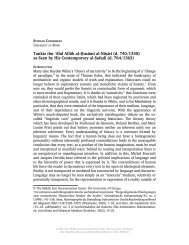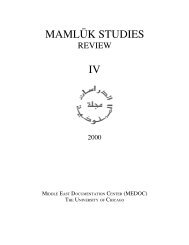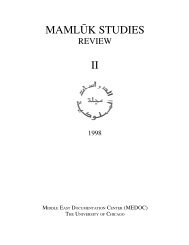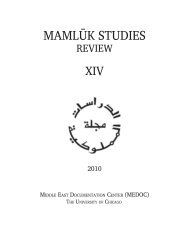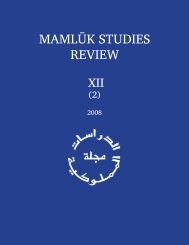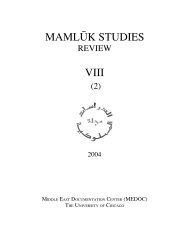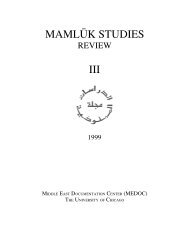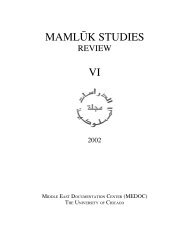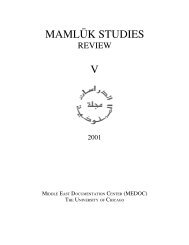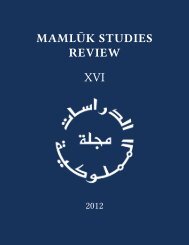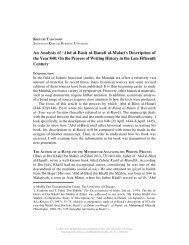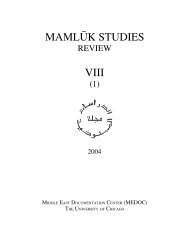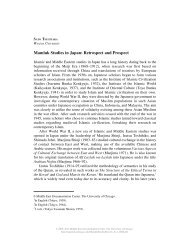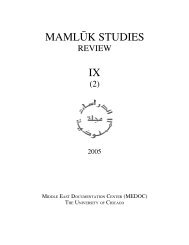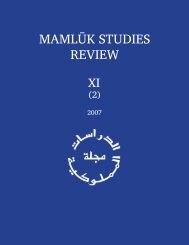Vol. VII, no. 1 (2003) - Mamluk Studies Review - University of Chicago
Vol. VII, no. 1 (2003) - Mamluk Studies Review - University of Chicago
Vol. VII, no. 1 (2003) - Mamluk Studies Review - University of Chicago
Create successful ePaper yourself
Turn your PDF publications into a flip-book with our unique Google optimized e-Paper software.
36 GEERT JAN VAN GELDER, POETRY FOR EASY LISTENING<br />
‘an jafa≠kum fa-ma≠ baq| f|ya fad˝lah<br />
Dhubtu shawqan fa-‘a≠liju≠n| bi-qurbin<br />
muttu ‘ishqan fa-h˝annit¸u≠n| bi-qublah<br />
Wa-ishghulu≠n| ‘an la≠’imin ma≠ ata≠n|<br />
bi-rasha≠din atat'hu a≠fatu ghaflah<br />
Qultu billa≠hi khallin| fa-tama≠dá<br />
Wa-qal|lun man yatruku al-sharra lillah<br />
[Tell him the details <strong>of</strong> my state, and all <strong>of</strong> it;<br />
perhaps he will have pity on me, maybe . . . !<br />
How <strong>of</strong>ten did I say "Ahem" when he appeared, being wary <strong>of</strong><br />
my watchful guard; how <strong>of</strong>ten did I feign a cough!<br />
I do <strong>no</strong>t stray from the right path <strong>of</strong> loving him,<br />
however much or little critics may reproach me.<br />
Intoxication by love's passion is a part <strong>of</strong> me by nature:<br />
and it is hard to change what's in one's nature.<br />
My masters, let me have your favor once again,<br />
after your harshness, for I can<strong>no</strong>t bear it any longer!<br />
I've pined away with passion; cure me <strong>no</strong>w with nearness!<br />
I've died <strong>of</strong> love; embalm me with a kiss!<br />
Distract me from a censurer—as soon as he<br />
tells me how to behave, he's plagued by inattentiveness:<br />
I say, "For God's sake, leave me!" But he perseveres.<br />
Few people will abandon evil "for God's sake."]<br />
This gives an idea <strong>of</strong> what Ibn H˛ijjah calls "fluency": <strong>no</strong> intricate word-play, the<br />
few antitheses are simple (line 3: hudá/d˝ala≠l, akthara/aqalla; line 5:<br />
rid˝a≠kum/jafa≠kum), as is the syntactic, semantic, and phonetic parallelism in line 6.<br />
Both halves <strong>of</strong> the poem (lines 4b and 8b) end with a maxim-like sentence, the<br />
latter being a little joke in that it gives a twist to the imprecation billa≠h in 8a, and<br />
using the colloquial lillah with short a in the last rhyme. If, as the earliest k<strong>no</strong>wn<br />
treatment <strong>of</strong> insija≠m, by Usa≠mah Ibn Munqidh, suggests, the "figure" was originally<br />
conceived as prose unintentionally coming out metrically, as poetry, then an<br />
important criterion is apparent artlessness. A test for poetry would consist in<br />
writing it out as prose, as I have done above, and see how long it takes for a new<br />
reader to discover that it is in fact poetry.<br />
Ibn H˛ijjah quotes some 112 different poets in the chapter (including himself,<br />
with a piece <strong>of</strong> 19 lines). 20 Many are well-k<strong>no</strong>wn, others are obscure or wholly<br />
20 Ibid., 274/1:475.<br />
© <strong>2003</strong>, 2012 Middle East Documentation Center, The <strong>University</strong> <strong>of</strong> <strong>Chicago</strong>.<br />
http://mamluk.uchicago.edu/<strong>Mamluk</strong><strong>Studies</strong><strong>Review</strong>_<strong>VII</strong>-1_<strong>2003</strong>.pdf



